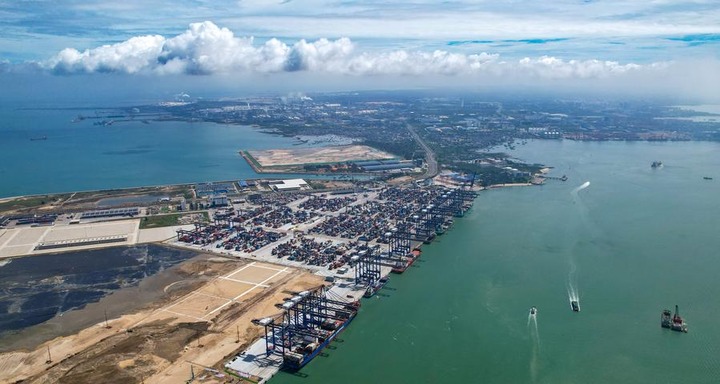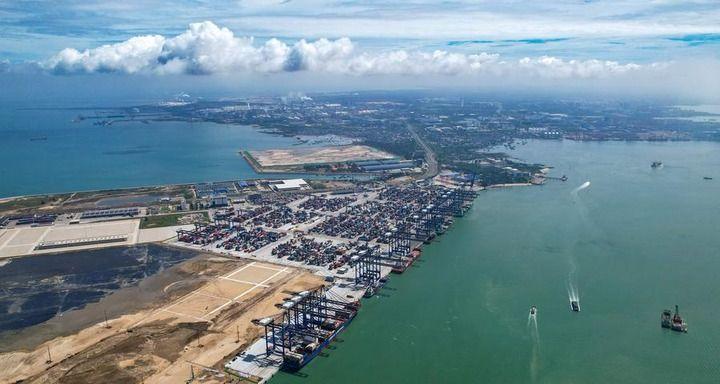
This aerial drone photo taken on May 28, 2025 shows a view of the Yangpu International Container Port in the Yangpu Economic Development Zone in Danzhou, south China's Hainan Province. (Xinhua/Yang Guanyu)
BEIJING, July 17 (Xinhua) -- Recent data from the General Administration of Customs shows that China's total imports and exports of goods reached 21.79 trillion yuan (about 3.05 trillion U.S. dollars) in the first half of 2025, up 2.9 percent from the previous year. Experts believe that the steady growth of foreign trade is inseparable from the strong support of finance.
Dong Ximiao, chief researcher at Merchants Union Consumer Finance Company Limited, said that since the beginning of this year, the financial sector has stepped up support for foreign trade enterprises. Through multiple measures such as policy coordination, product innovation, and technology empowerment, it has effectively addressed financing challenges, lowered transaction costs, and injected strong impetus into stabilizing foreign trade.
-- Facilitating steady business operations through innovative financial products
In the past months, the banking sector has rolled out a series of action plans to stabilize foreign trade, accelerating policy implementation and safeguarding resilience for foreign trade enterprises through a dual-track approach combining credit support and risk hedging.
An electronics export firm in south China's Guangdong Province, facing declining overseas market demand and weakening profitability, received a tailored financing solution from the Dongguan branch of China Guangfa Bank to address the urgent needs.
Targeting pressure from capital turnover difficulties and high financing costs, the bank designed a customized plan aligned with the company's development requirements. The entire process from solution design to fund disbursement was completed within 10 working days.
To enhance enterprises' capability in managing and responding to foreign exchange risks, banking institutions have also developed diversified hedging products. The Shenzhen branch of Postal Savings Bank of China recently delivered a ratio spread option service, which is a solution specifically designed for businesses with experience in foreign exchange derivatives trading, and seeking to refine foreign exchange cost structures through innovative financial instruments.
This innovative product offers a more flexible and optimized foreign exchange risk management solution, according to a product manager at the Shenzhen branch of Postal Savings Bank of China.
-- Stimulating new vitality in cross-border trade
Cross-border e-commerce and other new foreign trade forms have seen rapid development in recent years. In response, the banking sector has actively innovated its financial service models to consistently stimulate new momentum in cross-border trade.
Earlier this year, Bank of China's Beijing branch launched its cross-border e-commerce export transaction in partnership with a leading domestic third-party payment processor.
It is introduced that this collaboration aims to establish an end-to-end cross-border financial service ecosystem integrating fund settlement, international payments and receivables, and risk control, effectively addressing pain points in capital flows for e-commerce businesses while enhancing settlement efficiency and reducing operational costs.
In 2024, the Beijing branch of Bank of China witnessed a transaction scale of nearly 20 billion yuan in the new foreign trade form of cross-border e-commerce, with a growth rate exceeding 10 percent, showcasing strong growth momentum.
For small and micro foreign trade enterprises, banking institutions are actively exploring ways to enhance the adaptability of financial products.
In May, the General Office of the National Financial Regulatory Administration issued a notice on effectively providing financial services for micro and small enterprises in 2025, explicitly urging intensified support for small and micro foreign trade enterprises to promote the stable growth of foreign trade.
Nowadays, there is an increased demand for China's private micro and small enterprises to expand international business, making it imperative to safeguard their ongoing internationalization efforts, according to Dong. (Edited by Yu Huichen with Xinhua Silk Road, yuhuichen@xinhua.org)




 A single purchase
A single purchase









